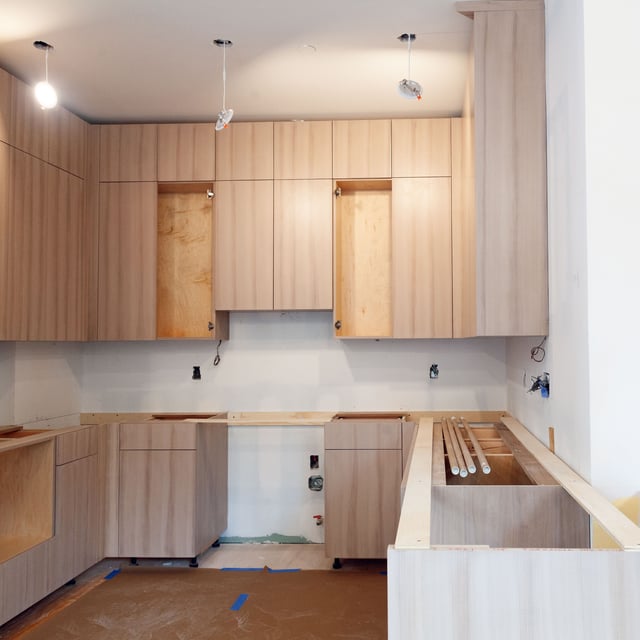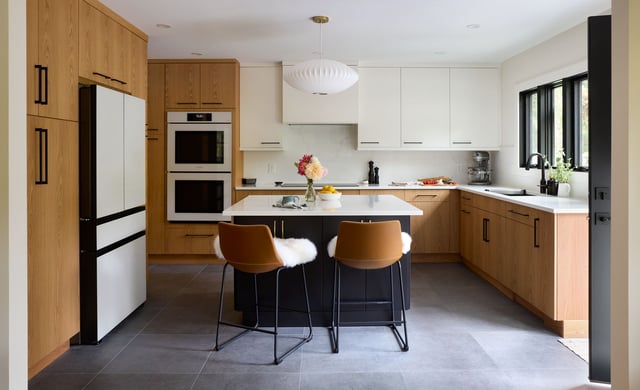
Kitchen
Non-Tile Kitchen Backsplashes - Alternative Ideas
12.06.2025


In This Article
Planning a kitchen remodel is an exciting but often overwhelming process, especially when it comes to financing. Whether you're looking to make small upgrades or completely transform your space this year, understanding your financing options is key to making your dream kitchen a reality. In this ultimate guide, we'll walk you through everything you need to know about the costs involved, the best financing options available, and how to secure the right loan for your renovation. Let's break it down and help you find the best way to fund your kitchen makeover.
Renovate now, pay later
Achieve the space you're looking for today, while financing it over time with our trusted partner.*
*Not available in NYC
Learn More
So, you've finally decided to tackle that outdated kitchen. Maybe the countertops are worn, the cabinets are creaky, and the layout just doesn't work for your family anymore. For your reasons, remodeling your kitchen can completely transform the heart of your home and your entire living space. But here's the catch: kitchen remodels can be expensive. That's where financing comes in. In this guide, we will walk you through everything you need to know about kitchen remodel financing, from understanding costs to choosing the best financing option for your situation.
Unless you have a significant savings fund set aside, financing is often the most realistic option for covering the cost of a kitchen remodel. The beauty of financing is that it allows you to spread out payments over time rather than dropping a lump sum upfront. This is especially helpful if you want to tackle your entire remodel at once instead of piecing it together over several years.
Financing a remodel can also allow you to make bigger and better updates than if you were limited by immediate cash. Maybe you've always dreamed of having high-end appliances, custom cabinetry, or marble countertops, but they're a bit out of reach for your current savings. With the right financing plan, you can get the kitchen you've always wanted without breaking the bank upfront.
However, it's important to approach financing thoughtfully. While it can be a great way to achieve your renovation goals, you'll want to be sure the monthly payments fit comfortably within your budget. We'll dive deeper into how to choose the right financing option, but first, let's break down how much you can expect to spend on your kitchen remodel.
The cost of a kitchen remodel can vary widely based on the size of your space, the materials you choose, and the scope of the work. On the low end, you might be able to make some cosmetic updates, like painting cabinets or installing new countertops, for around $10,000 to $15,000. But if you're planning a full-scale renovation with new appliances, flooring, cabinets, and structural changes, you're looking at an average of $20,000 to $50,000 or more.
Here's a quick breakdown of common kitchen remodel costs:
Of course, these are just averages. Your final cost will depend on several factors, which we'll explore in the next section.
Many variables influence the final cost of your kitchen remodel. Here are the key factors that can drive up or lower your expenses:
Now that you have an idea of how much your remodel might cost, let's examine the financing options available to help you cover the expenses.
When it comes to financing a kitchen remodel, you've got plenty of choices. The right option for you will depend on your financial situation, the size of your remodel, and how you prefer to manage debt. Let's break down some of the most common financing options available for kitchen remodels.
A personal loan is one of the most popular ways to finance a kitchen remodel. Personal loans are typically unsecured, meaning you don't need to use your home as collateral. You'll borrow a lump sum from a lender (like a bank, credit union, or online lender) and pay it back in fixed monthly payments over a set period, usually with a fixed interest rate.
Pros:
Cons:
If you've built up home equity equity in your home, a home equity loan or line of credit (HELOC) could be a great way to finance your kitchen remodel. A home equity loan allows you to borrow against the equity in your home with a fixed interest rate, while a HELOC provides a revolving line of credit that you can draw from as needed. Both options typically come with lower interest rates than personal loans because your home secures them.
Pros:
Cons:
For smaller kitchen remodels or specific purchases (like appliances or countertops), some homeowners turn to credit cards. If you qualify for a card with a 0% introductory APR, this can be an affordable way to finance part of your project—provided you can pay off the balance before the promotional period ends.
Pros:
Cons:
Depending on your circumstances, you may be able to take advantage of government-backed financing programs for your kitchen remodel. One example is the FHA 203(k) loan, which allows you to finance both the purchase of a home and the cost of its renovation in a single mortgage. These loans are typically used for more extensive renovation projects.
There are also energy-efficient home improvement loans available through government programs, which may be helpful if your kitchen remodel includes energy-saving upgrades.
Pros:
Cons:
Some contractors offer in-house financing or have partnerships with lenders to provide financing options for their clients. This can be a convenient way to bundle your financing and renovation services together, but be sure to compare the terms to other loan offers to ensure you're getting the best deal.
Pros:
Cons:
With so many financing options available, it can be tough to decide which one is best for you. Here are some key factors to consider when choosing how to finance your kitchen remodel.
Before applying for any type of loan or credit, it's important to examine your financial situation closely. Start by reviewing your current debt, income, and monthly expenses. How much can you afford to borrow? What kind of monthly payments can you comfortably manage?
Consider your future financial goals as well. Are you planning any other major expenses, like buying a car or saving for your child's college education? Make sure your remodel financing doesn't interfere with your other financial priorities.
Interest rates can vary significantly depending on the type of loan, your credit score, and the lender. A small difference in interest rates can result in big savings over the life of your loan, so it's worth shopping around to find the best deal.
Pay attention to the loan terms as well. While a longer loan term might result in lower monthly payments, you'll likely pay more in interest over time. On the other hand, a shorter loan term could save you money in the long run, but the higher payments could put a strain on your budget.
When comparing loan options, don't forget about the fees. Many loans come with origination fees, application fees, or even closing costs, especially if you're using a home equity loan or HELOC. These fees can add up, so be sure to include them in your overall budget when evaluating your financing options.
It's easy to focus on the monthly payments, but it's important to look at the bigger picture. How much will you pay in total over the life of the loan? Use an online loan calculator to factor in the interest rate, loan term, and any fees to get a clear picture of the total cost.
Once you've decided on the best financing option for your kitchen remodel, you'll need to focus on securing the best loan terms possible. Here are some tips to help you get approved for a loan and save money on interest.
Your credit score is one of the most important factors lenders consider when approving you for a loan. The higher your credit score, the more likely you are to qualify for a loan with a lower interest rate. If your score isn't where you'd like it to be, consider improving it before applying for a loan. This might include paying down existing debt, correcting errors on your credit report, and avoiding new credit inquiries in the months leading up to your loan application.
It's always a good idea to shop for the best loan offers before financing. Different lenders may offer different interest rates, loan terms, and fees, so take your time to compare multiple options. Don't be afraid to negotiate with lenders to see if you can get a better deal.
Financing a kitchen remodel can be a smart way to spread out the cost of your renovation, but it's important to avoid common mistakes. Here are some pitfalls to watch out for:
A kitchen remodel can be a game-changer for your home but also a significant financial investment. Fortunately, plenty of financing options are available to help you turn your dream kitchen into a reality without draining your savings. By assessing your financial situation, comparing loan options, and carefully planning for the cost of your remodel, you can choose the right financing option that works for your budget and long-term goals.
No matter which route you take, the key to successful kitchen remodel financing is to plan carefully and avoid taking on more debt than you can comfortably handle. With the right financing strategy in place, you'll be able to enjoy your newly renovated kitchen and the peace of mind that comes with knowing your finances are in good shape.

Written by Jordi Lippe-McGraw
Jordi Lippe-McGraw
What is a realistic budget for a kitchen remodel?
How do most people pay for a kitchen remodel?
What type of loan is best for a kitchen remodel?
How does a home equity loan work for a kitchen renovation?
Can I finance a kitchen remodel with bad credit?
What are the typical interest rates for kitchen remodel loans?
How much can I borrow to finance my kitchen renovation?
What is the average repayment period for kitchen remodel loans?

Kitchen
Non-Tile Kitchen Backsplashes - Alternative Ideas
12.06.2025

Kitchen
Perfecting Industrial Kitchen Design With Your Remodel
12.04.2025

Kitchen
Farmhouse Kitchen Remodel Ideas from Block
12.04.2025

Kitchen
Best Types of Lighting For Your Kitchen Design
12.04.2025

Kitchen
A Pound Ridge Kitchen Remodeled: From Dated to Modern
10.14.2025
Renovate confidently